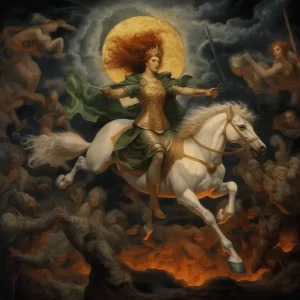Lugh: The Tuatha Dé Danann God
Lugh, also known as Lug, Lugh Lámhfhada, or Lugh the Long-Armed, is a prominent figure in Irish mythology, known for his skill and prowess in various arts and crafts. He is a member of the Tuatha Dé Danann, a race of Celtic god-like beings in Irish mythology who represent the natural forces and elements. According to the Lebor Gabála Érenn, an 11th-century collection of Irish myths and legends, he was the son of Cian, a member of the Tuatha Dé Danann, and Ethniu, the daughter of the Fomorian giant Balor. The Fomorians were a race of monstrous beings in Irish mythology who fought against the Tuatha Dé Danann for the control of Ireland.
Lugh’s Arrival at Tara
One of the most famous stories involving Lugh is his arrival at the royal court of Tara. According to the tale, he came to the court seeking a place among the noble warriors of the Tuatha Dé Danann. The gatekeeper asked what skills he possessed, to which he replied that he was a skilled warrior, harpist, poet, historian, craftsman, and sorcerer. The gatekeeper informed him that each of these skills was already represented at the court, and he would need to possess a unique skill to gain entry.
Undeterred, he asked the gatekeeper if there was anyone at court who possessed all these skills simultaneously. When the gatekeeper admitted that there was no such person, Lugh was granted entry and soon became a prominent figure at the court, eventually leading the Tuatha Dé Danann in the Second Battle of Magh Tuireadh.
The Second Battle of Magh Tuireadh
The Second Battle of Magh Tuireadh is one of the most significant events in Irish mythology, as it marks the victory of the Tuatha Dé Danann over the oppressive Fomorians, he played a crucial role in this conflict, showcasing his incredible talents and leadership skills. He assembled a formidable army, bringing together the various tribes and factions of the Tuatha Dé Danann.
Before the battle, he challenged his grandfather, Balor, to a single combat. Balor was known for his deadly eye, which could kill or petrify anyone who looked upon it. Lugh, however, managed to kill Balor by using a sling to shoot a stone into Balor’s eye, driving it out the back of his head and killing the Fomorian soldiers behind him. This act of heroism turned the tide of the battle in favor of the Tuatha Dé Danann, who emerged victorious and established their rule over Ireland.
Lugh’s Skills and Attributes
He is renowned for his mastery of various arts and crafts, making him an exemplary figure in Celtic mythology. Some of his most notable skills and attributes include:
- Warrior: He was known for his exceptional combat skills and strategic thinking, as demonstrated during the Second Battle of Magh Tuireadh.
- Harpist: Lugh’s talent as a harpist was legendary, and it is said that he could soothe even the most troubled souls with his beautiful music. The Irish Harp is an instrument and symbol steeped in history.
- Poet: As a poet, He was adept at composing intricate verses and reciting them with eloquence and emotion.
- Historian: Lugh had an encyclopedic knowledge of history and genealogy, which he used to unite the various factions of the Tuatha Dé Danann during the Second Battle of Magh Tuireadh.
- Craftsman: He was a master of numerous crafts, including metalworking, woodworking, and weaving. His ability to create remarkable artifacts was unmatched among the Tuatha Dé Danann.
- Sorcerer: Lugh’s magical abilities were a vital aspect of his skillset, and he used these powers to manipulate the elements and control the forces of nature.
Lugh’s Weapons and Treasures
His association with craftsmanship and magic extends to his possession of various powerful weapons and treasures, which include:
- Spear of Lugh (Lúin Celtchair): This magical spear was said to be impossible to overcome in battle, always finding its mark and returning to Lugh’s hand after striking its target.
- Sling of Lugh: He used his sling to kill Balor during the Second Battle of Magh Tuireadh, making it a symbol of his victory over the Fomorians.
- Sword of Lugh (Fragarach): Also known as “The Answerer” or “The Retaliator,” this magical sword was said to be able to cut through any armor or shield and compel the truth from anyone it was pointed at.
- Harp of Lugh: His magical harp had the power to create various enchanting melodies, bringing joy or sadness to its listeners, and even controlling the seasons.

Lugh’s Connection to the Harvest Festival Lughnasadh
He is closely associated with the harvest festival Lughnasadh, celebrated on August 1st. This festival, also known as Lammas, marks the beginning of the harvest season and is dedicated to Lugh in honor of his foster mother, Tailtiu. According to legend, Tailtiu died after clearing the plains of Ireland to make way for agriculture, and Lugh established the festival in her memory.
Lughnasadh was a time for feasting, athletic competitions, and matchmaking, reflecting his diverse talents and associations with prosperity and abundance. The celebration also had a strong connection to the sun, as he was seen as a solar deity, bringing light and warmth to the world.
Pronunciation of Lugh
The pronunciation of the name “Lugh” can vary slightly depending on regional accents and linguistic nuances. In most cases, Lugh is pronounced as /luː/ or /luːx/, rhyming with the English word “loo” with a subtle “gh” sound at the end, similar to the “ch” sound in the Scottish word “loch.” The “gh” sound is produced by constricting the back of the throat, creating a soft, breathy, unvoiced sound.
Origin of the Word Lugh
The origin of the word “Lugh” can be traced back to the Old Irish language, which was spoken between the 6th and 10th centuries. The name is derived from the Old Irish word “lug,” which is believed to be related to the Proto-Celtic word “lugus” or “lugos.” This Proto-Celtic term is the reconstructed common ancestor of the word “Lugh” and its equivalents in other Celtic languages.
In the broader context of Indo-European languages, “Lugh” is thought to be connected to the Proto-Indo-European word “*leuk-“, which means “light” or “brightness.” This etymological link further strengthens the association of Lugh with the sun and light, as the deity is often considered a solar figure in Celtic mythology.
The name “Lugh” and its variations appear in the mythologies of various Celtic cultures. For example, in Welsh mythology, the name appears as “Lleu Llaw Gyffes,” a central figure in the Fourth Branch of the Mabinogi, a collection of Welsh legends. Additionally, in Gaulish inscriptions, the name is found as “Lugus,” reflecting the deity’s widespread influence across the Celtic world.
Lugh Anime – the world’s finest assassin lugh
Lugh’s character and mythology have also found their way into the world of anime, demonstrating the far-reaching impact and appeal of this multifaceted Celtic deity. Anime creators often draw inspiration from various mythologies to build their fantastical worlds, and his diverse talents and attributes make him a fitting choice for such adaptations.
In the anime series “Trinity Seven,” for example, he appears as a character named Lugh Ciel, who is one of the members of the show’s titular group. She is portrayed as a skilled magic user, reflecting the sorcery abilities attributed to the original Lugh from Celtic mythology. Additionally, she is depicted wielding a spear, an homage to Lugh’s legendary weapon, the Spear of Lugh. This connection to Lugh’s attributes and weapons showcases how the anime creators have incorporated elements from the original mythological figure into their character design.
The use of Lugh in anime not only adds depth and intrigue to the narratives, but also introduces a new generation of viewers to the rich tapestry of Celtic mythology. By incorporating Lugh and other mythological figures into their works, anime creators help to preserve and share these ancient stories, fostering a greater appreciation and understanding of the cultures from which they originated.
Assassin’s Creed – Lugh’s Spear and Armor
The popular game Assassin’s Creed has also drawn inspiration from the Celtic God Lugh’s mythology. There is a special set of armor called Lugh’s Armor and a weapon called Lugh’s spear.

